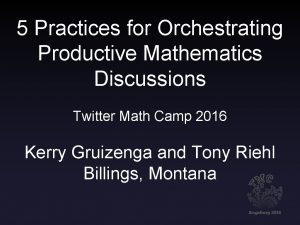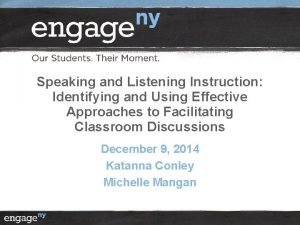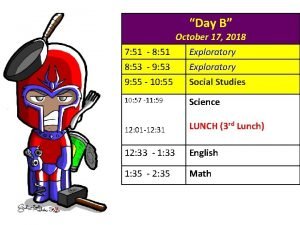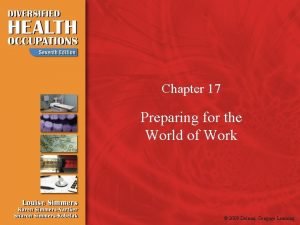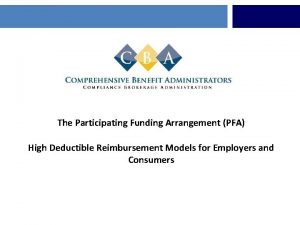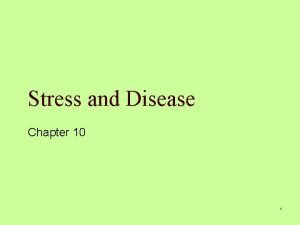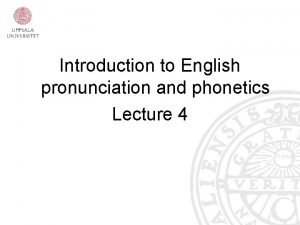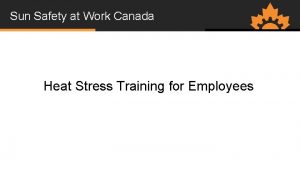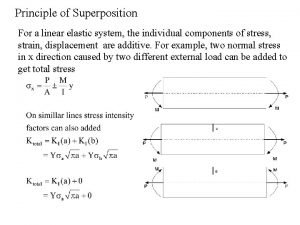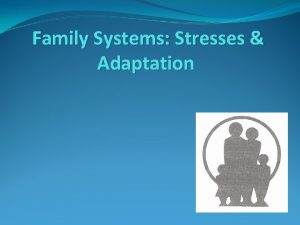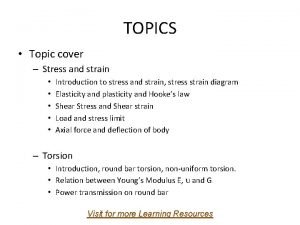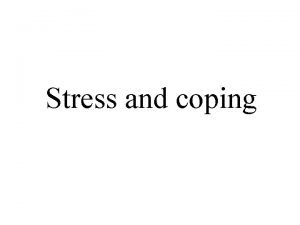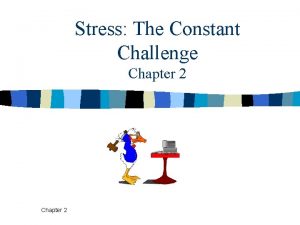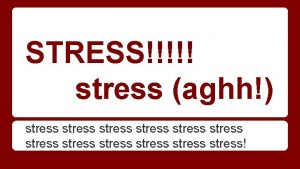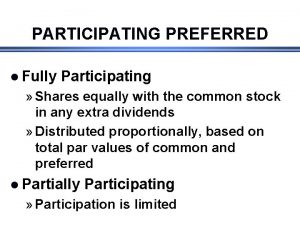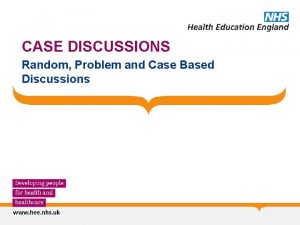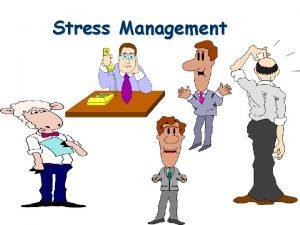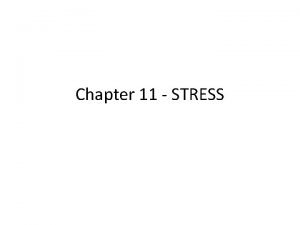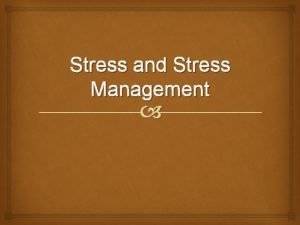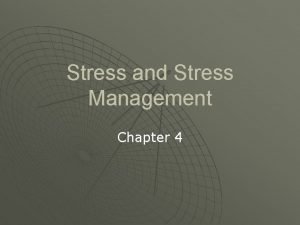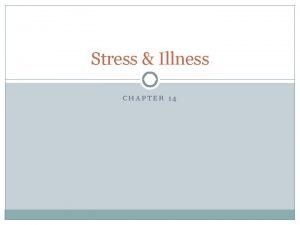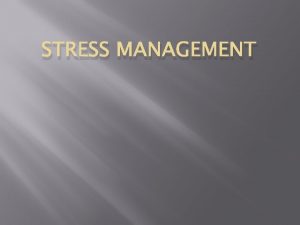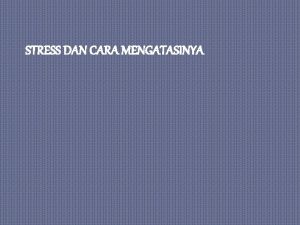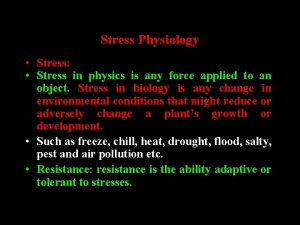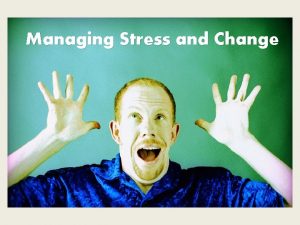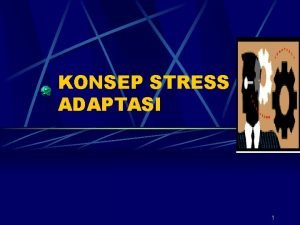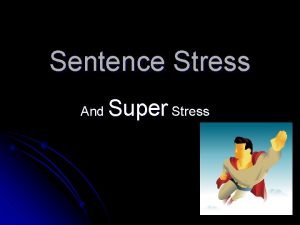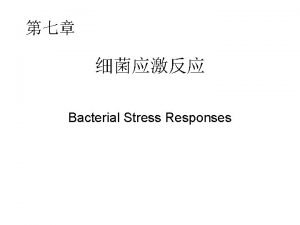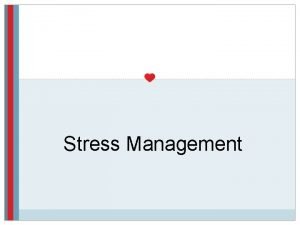Stress Participating in discussions What is stress l




































- Slides: 36

Stress Participating in discussions

What is stress? l It is a mental or physical tension that can result from different causes l People are stressed when they find themselves in danger or in an unfamiliar environment. l It is a condition which has both physical and emotional effects.

As a positive thing stress can. . . l Force us to take action l Awaken you when you need to react l It can open our eyes for new perspectives l If in small amounts, it can improve our working performance l Make us better competitors

As a negative influence stress can. . . l Increase our anger, depression, distrust l Cause headaches, upset stomach, cause insomnia, high blood pressure. . . l Ruin our good working performances l In extreme cases it can cause serious illness and even death (stroke)

We can learn how to manage stress and how to use it to help us: l Positive stress adds excitement to life but too much can even kill us l We need to find optimal amount of stress in life (the amount is not equal for all people) l What is distressing to one may be a positive stimulus to another, so we need to find out for ourselves

We must become aware of our stressors: l Notice your stress, don’t ignore it l Determine what events distress you l See how your body reacts to stress l In what way do you become upset?

See what you can change: l Can you change your stressors by avoiding them? l Can you reduce their intensity? l Can you shorten your exposure to stress?

Learn to control your physical reactions to stress: l Slow, deep breathing will help l Relaxation techniques can reduce muscle tension l Some medications can help, but only in the short term

Build your physical reserves: l Do some exercises (fitness) three to four times a week. l Eat well-balanced, nutritious meals. l Mantain your ideal weight. l Avoid nicotine, too much caffeine and other stimulants. l Mix leisure with work. Take breaks and get away when you can.

Maintain your emotional reserves: l Develop some friendships and relationships l Have goals which are meaningful to you. l Always expect some frustrations, failures and sorrows l Always be kind and gentle to yourself-be a friend to yourself

Stress at work: l Can be caused by work overload l Sometimes tough jobs can be stressful l Some people can cause stress (if your boss undermines you or makes unreasonable demands) l Working environment: commuting can be frustrating just as badly organised work spaces

In the business world we often hear of rat race: l It is an intense competitive struggle where many people compete for the same goal l It is also a terrible routine which leaves no time for relaxation l Very often it is an endless pursuit which gives false hopes of achieving something l Rat race is also called treadmill

Workaholics are the most stressed people: l They are people with a compulsive need to work l Workaholics are addicted to work without knowing it l Sometimes this addiction can be pleasurable to the victim or it may be a burden and a trouble

Deadline is a very frequent stress cause: l It is a point in time at which some task must be completed l It is a time limit (due date) which must be respected at work l It is the last possible time in which to complete a task l The deadline is often externally imposed

Some solutions to stress at work are: l Flexitime (a variable work schedule which permits you to arrange your working hours as you like) l Downshifting (working in less stressful ways, choosing a simple life away from the western consumerist lifestyle) l Job satisfaction (how content you are with your job, your attitude towards your job)

People like work that is rewarding and gives them satisfaction: l For this reason some amount of pressure might be necessary l Many employees want the work that stretches them, that is difficult because that is stimulating and challenging l But when the pressure builds up, it’s easy to feel overwhelmed by work and this can cause stress

Today a whole stress industry has grown up: There are stress counsellors and stress therapists to give you advice how to avoid stress l Other experts say that stress levels today are lower than they used to be (they point out the difficult working conditions and long hours of our grandparents) l Perhaps the materialism of the modern times gives you the illusion that we sould have control over our lives l

An expert talks about stress: l The major causes of stress at work today are job insecurity (many people feel they couls easily lose their job), long working hours (negative work-life balance) l The typical family is a working family, with both members working which causes problems l 40 or 50 years ago none of these problems existed

Advice on how to cope with stress: l First, find the cause of stress (it might be long working hours or not enough freedom in organising your own work) l Each problem needs different solution l The situation changes depending on whether the person is a man or a woman l Women are more flexible and men tend to become angry when stressed

An unusual story: Banker swaps rat race for bus lane A bank manager has given up his 30 000 pound a year job with Nat. West to realise his childhood ambition of becoming a bus driver. l Despite the 11 000 pound salary and anti-social hours, John Burgin, 48, has never been happier. l “Banking was a career but in the end it became just a job. Once I knew I was leaving, I use to go outside at lunchtime and watch as the buses drove up and down. The time had come. ” l

His passion was awakened as a boy growing up in Sheffield, where he collected bus maps and timetables. l But he went on to spend nearly 30 years working his way up through Nat. West. l “The levels of stress are totally different. At the bank, things were very political: I worked hard all day and then took work home, and it never really finished. There is stress in driving a bus around Bristol, but it’s a different kind and I don’t take it home. l

Participating in discussions Some useful language and examples

Making suggestions: Giving opinions: l l l We could offer staff a wider choice of food. Why don’t we change the menus? How about offering healthier meals? What about having a nosmoking policy? I think we should send out a questionnaire. I think that we should ask the staff. l I feel that we have to consider the cost. l I’m sure/convinced/positive that people would like it. l

Agreeing: Disagreeing: Yes, that’s right. l I think I agree with you. l Exactly. l Good/excellent idea. l l Yes, but what about the cost? l I’m not sure I agree. l I really don’t agree.

An example of discussion: l. I think we should do a lot more to improve our staff’s health and fitness. What do you think, Monica? l I agree. For one thing we could offer them a free medical checkup every year. l Right. That’s a good idea. A lot of firms do that. And how about having a no-smoking policy in the staff restaurant? What do you think about that, Tanya?

Mm, I don’t think I like the idea very much. A lot of our staff smoke-they’d be against it, I’m sure of that. I think we should improve the food. A lot of the dishes aren’t healthy. l True. We could change the menus and offer healthier meals. I like the idea. l What about setting up a counselling service, Vincent? Some staff are under a lot of stress. l

l l l I don’t know, Monica. It would be very expensive to set up a service like that. I’ve got another suggestion. We could talk to the manager of our local sports centre and arrange a company membership. What do you think, Tanya? Mm, I don’t know. It sounds interesting but it could be very expensive. What’s your opinion Monica? I think you’re right Tanya. It would cost a lot and I’m not sure how many staff would actually use the centre.

l. I can’t agree with you there. It’s got a very good pool and sauna. l Yes, it’s worth checking out, I suppose. A lot of staff might enjoy having a swim at lunchtime or after work. l Maybe, but there are so many other things we could do.

Eating and drinking Multi word verbs

Put the following into a logical order: l Look at the menu l Ask for the bill/check l Book a table/ make a reservation l Leave a tip l Have the main course l Have a dessert l Order a starter l Have an aperitif

Write the foods below under the correct headings: Lamb, broccoli, eggs, banana, beef, peas, crab, beans, melon, pasta, lemon, tomato, lobster, fish, potato, cheese, onion, veal, chicken, prawns, apple, mussels, orange, rice FRUIT: MEAT: VEGETABLE: SEAFOOD: OTHER FOODS:

Match the options to describe some drinks: l l l Black/white Still/sparkling Red/white Single/double Bottled/draught With milk/lemon l l l Beer Wine Water Tea Coffee whisky

Multi word verbs (phrasal verbs): They are combinations of VERB + particles (at, away, down, in, on, up) l There are different types: 1. Without an object (Something has come up. ) 2. With an object-separable (Could you turn on the coffee machine? Could you turn the coffee machine on? ) l

3. Many phrasal verbs are informal (How did you find out? ) 4. Many phrasal verbs are idiomatic; their meaning is difficult to interpret: away (creating distance) I’m going away next week. on (continuing) Carry on the good work.

over (considering) I need time to think it over. up (completing) Some urgent matters need clearing up. Drink up. We’ ve got to go.

Match these sentence halves: l l l l Last week, I had to look First, I showed them around I certainly look forward I hope I can take One of them did not turn The food was deliciuos, and we all got Then, I took them out They said I should l l l l come over and see them in Coimbra the Old Town after five clients from Portugal on really well to a very good restaurant to seeing them all again up their invitation next summer up, unfortunately
 5 practices for orchestrating productive math discussions
5 practices for orchestrating productive math discussions Speaking and listening: effective group discussions
Speaking and listening: effective group discussions Classroom discussions in math
Classroom discussions in math Kyra is participating in a fundraiser walk a thon
Kyra is participating in a fundraiser walk a thon Chapter 17:4 participating in a job interview
Chapter 17:4 participating in a job interview Participating contracts
Participating contracts Participating funding arrangement
Participating funding arrangement Thank you for participating images
Thank you for participating images Vopc diagram
Vopc diagram Situational leadership
Situational leadership Test chapter 18 preparing for the world of work
Test chapter 18 preparing for the world of work Chapter 10 stress responses and stress management
Chapter 10 stress responses and stress management True strain formula
True strain formula Definition of axial stress
Definition of axial stress Abnormal psychology chapter 2
Abnormal psychology chapter 2 Djel pronunciation
Djel pronunciation The stress doc
The stress doc Types of stress in life orientation
Types of stress in life orientation Faktor aktivitas dan faktor stress
Faktor aktivitas dan faktor stress Define tolerable stress
Define tolerable stress What is heat stress
What is heat stress Chapter 3 managing stress
Chapter 3 managing stress Reactive non stress test
Reactive non stress test What is differential stress
What is differential stress Stress that comes from unpleasant situations is known as
Stress that comes from unpleasant situations is known as Principal stress
Principal stress Principle of superposition in stress and strain
Principle of superposition in stress and strain Reuben hill family stress theory
Reuben hill family stress theory Shear strain symbol
Shear strain symbol Health psychology mcqs
Health psychology mcqs Dealing with call center stress
Dealing with call center stress Stress as a stimulus
Stress as a stimulus Teller deklination
Teller deklination Stress
Stress Accentuates definition
Accentuates definition Chapter 2 stress the constant challenge
Chapter 2 stress the constant challenge Organisational stress
Organisational stress
